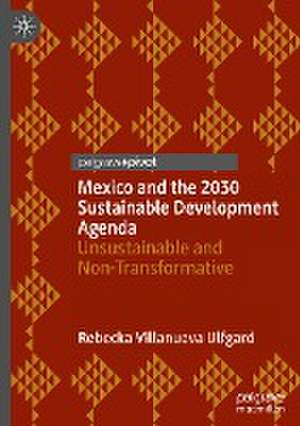Mexico and the 2030 Sustainable Development Agenda: Unsustainable and Non-Transformative: Governance, Development, and Social Inclusion in Latin America
Autor Rebecka Villanueva Ulfgarden Limba Engleză Hardback – 18 noi 2023
Preț: 323.45 lei
Nou
Puncte Express: 485
Preț estimativ în valută:
61.90€ • 64.46$ • 52.31£
61.90€ • 64.46$ • 52.31£
Carte tipărită la comandă
Livrare economică 07-21 martie
Preluare comenzi: 021 569.72.76
Specificații
ISBN-13: 9783031447273
ISBN-10: 3031447271
Ilustrații: XIX, 233 p. 4 illus., 2 illus. in color.
Dimensiuni: 148 x 210 mm
Greutate: 0.46 kg
Ediția:1st ed. 2023
Editura: Springer International Publishing
Colecția Palgrave Macmillan
Seria Governance, Development, and Social Inclusion in Latin America
Locul publicării:Cham, Switzerland
ISBN-10: 3031447271
Ilustrații: XIX, 233 p. 4 illus., 2 illus. in color.
Dimensiuni: 148 x 210 mm
Greutate: 0.46 kg
Ediția:1st ed. 2023
Editura: Springer International Publishing
Colecția Palgrave Macmillan
Seria Governance, Development, and Social Inclusion in Latin America
Locul publicării:Cham, Switzerland
Cuprins
Chapter 1: Framing Mexico’s Unsustainable and Non-transformative Implementation of the 2030 Agenda for Sustainable Development with López Obrador.- Chapter 2: People-centered Development: SDG1 in Focus.- Chapter 3: Planet-centered Development: SDG7, SDG9, and SDG15 in Focus.- Chapter 4: Peace-centered Development: SDG16 in Focus.- Chapter 5: Conclusions and Future Research Avenues.
Notă biografică
Rebecka Villanueva Ulfgard is Associate Professor in International Studies at the Instituto Mora, Mexico City.
Textul de pe ultima copertă
This book explores how and why Mexico’s approach to the 2030 Agenda for Sustainable Development and Sustainable Development Goals (SDG) implementation with the López Obrador administration is unsustainable and non-transformative, overshadowed by his vision of Mexico’s “Fourth Transformation”. Approached as a super mantra revolving around “Republican Austerity” and “First, the poor”, it provides original analysis of structural and conjunctural challenges facing Mexico as regards People-, Planet-, and Peace-centered development. The book reveals the promise “First, the poor” is inconsistent with data on Mexico’s poverty reduction (SDG1). Despite record-high spending on social programs and unmatched coverage, the recent tendency of improvement in tackling poverty is rather ambiguous from the perspective of multidimensional poverty. The book covers access to clean energy (SDG7), resilient infrastructure and sustainable industrialization (SDG9), and safeguarding biodiversity (SDG15) by examining three megaproject case studies: the oil refinery Dos Bocas, the Interoceanic Corridor of the Isthmus of Tehuantepec, and the Maya Train, generating concern with the economic, environmental, and social dimensions of sustainable development. The prospects for an ‘enabling environment’ for SDG implementation are hampered by persistently high levels of homicides and impunity (SDG16). Turning Mexico’s Armed Forces into ‘first development partner of choice’ is problematized as regards their reach in infrastructure megaprojects and social welfare programs, in the overall context of the ‘de-risking state’ favoring private capital. The result, as determined by Villanueva Ulfgard, has led Mexico further astray from sustainable and transformative development.
Rebecka Villanueva Ulfgard is Associate Professor in International Studies at the Instituto Mora, Mexico City.
Caracteristici
Applies critical approaches to the 2030 Agenda for the Sustainable Development Goals Reveals how the López Obrador administration understands development of Mexico’s “Fourth Transformation” Considers structural and conjunctural challenges facing Mexico vis-à-vis People-, Planet and Peace-centered development















